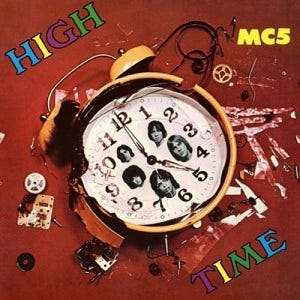
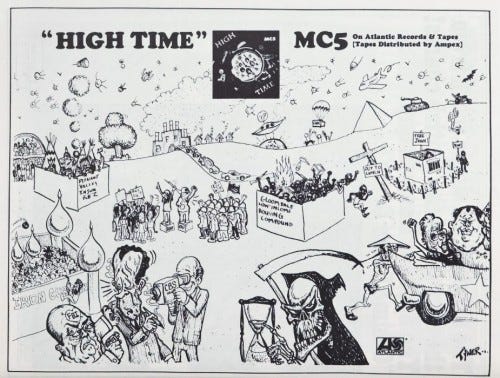
High Time, MC5. Atlantic, 1972/Rhino CD, 1992.
review source and publication date unknown
On December 12, Rob Tyner (1944 – September 18, 1991), the lead singer for Detroit’s MC5, would have turned 80. He shared a birthday with Lester Bangs, who wrote the indelible pan of Kick Out the Jams for Rolling Stone (a “ridiculous, overbearing, pretentious album; and maybe that's the idea, isn't it?”). This sealed both band and its critic’s quixotic reputations. The tumult sucked in Jon Landau, that magazine’s reviews editor, and Bruce Springsteen’s future producer/manager, who helmed the follow-up, Back in the U.S.A. But the next record, the self-produced High Times, remains the band’s most convincing play for proto-punkers cracking the tension between yawp and listenability. And the country keeps seeking this preternatural energy as if stuck in a loop…
THE LIVE DEBUT of Detroit's chthonic punk band, the MC5's Kick Out the Jams, was such a tour de force of futuristic chaos that any producer would have shuddered at the thought of taming the animal for the studio. But tame is hardly what Jon Landau did, at least to the music. Instead, on Back in the USA, the Five steered toward a reasonably bustling approximation of its live sound while giving plenty of definition to individual players. Bookended by oldies manifestoes (Little Richard's "Tutti-Frutti" and Chuck Berry's "Back in the U.S.A."), the group is at once recognizable and a little friendlier. Fred Smith's "Shakin' Street" is the hit MC5 never had, and "Let Me Try" is a convincing ballad that grasps the meaningful white rasp that the inferior Guess Who stole.
…the Five steered toward a reasonably bustling approximation of its live sound while giving plenty of definition to individual players.
The group-produced High Time works even better, not only because it's longer, but because the pace works to the band's favor. From the opening shivers of Smith's Catholic broadside, "Sister Anne," with its rippling piano and slashing-dagger guitar breaks, High Time takes the band down to commercial ruin with surrounded by such tightly wound coils as "Poison" and "Baby Won't Ya." The pleasure with both these reissues is that the cleaned-up sound of the CD only enhances MC5's charm. Anyone tuning in today might mistake this mishmash of heartland radicalism and stylistic primalism for a lot of things, but it certainly couldn't be called unmusical.
Lester Bangs on Kick out the Jams in Rolling Stone, 5 April 1969
Greil Marcus on Back in the USA in Rolling Stone, 14 May 1970
Steal a Lot and They Make You King
Dylan essay scheduled for Sunday, December 22, in the Los Angeles Review of Books
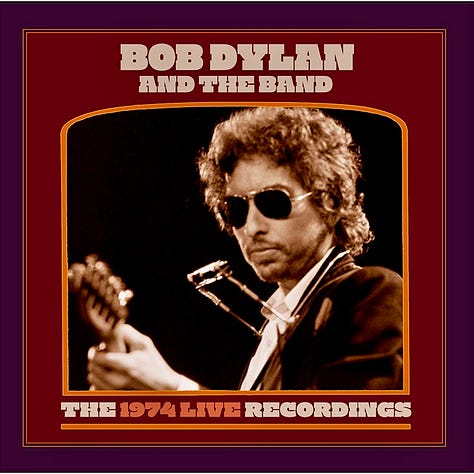
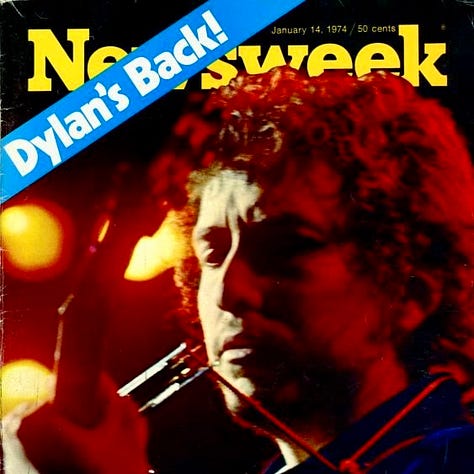
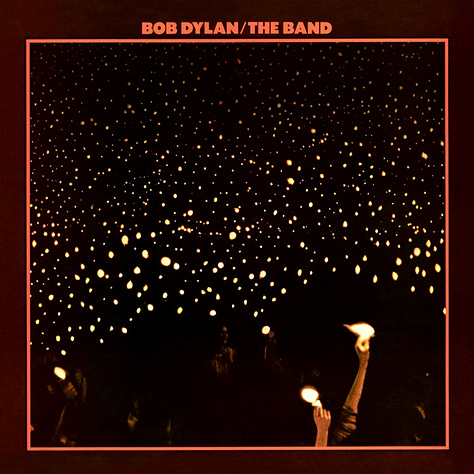
The 1974 Live Recordings, Bob Dylan and The Band
27 discs, Sony box set
Double dare: watch A Complete Unkown, then try to imagine the movie’s protaganist leading these concerts… you can’t.
People forget how worn down the youth movement felt in early January, 1974, when Bob Dylan launched his comeback tour with The Band at Chicago Stadium. The Watergate hearings of the summer before had exposed both hack skullduggery and its subsequent cover-up after President Nixon’s landslide win against his anti-war opponent, Senator George McGovern, in 1972. Spiro Agnew resigned under a cloud of extortion, bribery, and tax evasion charges, and Chief Justice Warren Burger swore in Gerald R. Ford as the new Vice-President in December, 1973. But even as his co-conspirators marched off to jail, Nixon remained in office.
Dylan plunged into a new sweep and drama that set off bombs inside these familiar songs, and they hit you differently, not just because everybody had grown older, but because they still had more to say, more threats to deliver, and metaphors that had only curdled over time…
After nearly a decade of teach-ins, Be-Ins, marches, riots, assassinations, protests, Woodstock, and the Kent State murders, the Vietnam War ground on, impervious to protest. Rock fans speculated wildly about the Next Big Thing, and whether hitting 30 meant you couldn’t be trusted anymore. The rock press harassed each former member of the Beatles for reunion quotes, and the Rolling Stones released “Angie,” a desultory single that signaled a shift from cultural to careerist authority…
noises off
In the pipeline: Preston Lauterbach’s riveting Before Elvis: The African American Musicians Who Made the King (Hachette, January 2025): “Like the hint of deism in the Declaration of Independence and the US Constitution, Elvis teases the Spirit without delivering an overly heavy dose of God…”
Next month: annual lists, lotsa new links, and Vive la Resistance!
From the archives: Bonnie Raitt, before the Kennedy Center Honors; Randy Newman when we need him most; and The Boys, ineptly titled but still gaining relevance…
More clips at timrileyauthor.com, featuring the riley rock index: obits, bylines, youtube finds, reference sites, pinterest, beacons.ai, random deep link





The back to the roots of having fun while playing Chuck Berry-inspired rock 'n roll at breakneck speed and amps turned to 11 on 'Back In The USA' was also the band's attempt to break free and reclaim their band from John Sinclair. 'High Time' is the sound of the band free from Sinclair's agenda, moving forward, creating THEIR music. It's a killer album and my favorite from the 5.